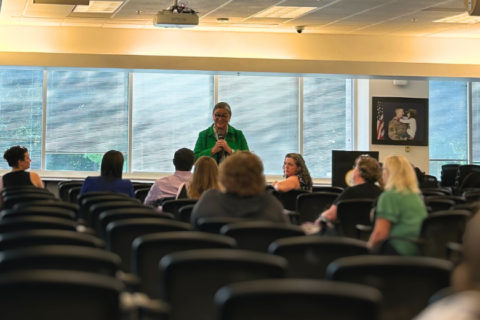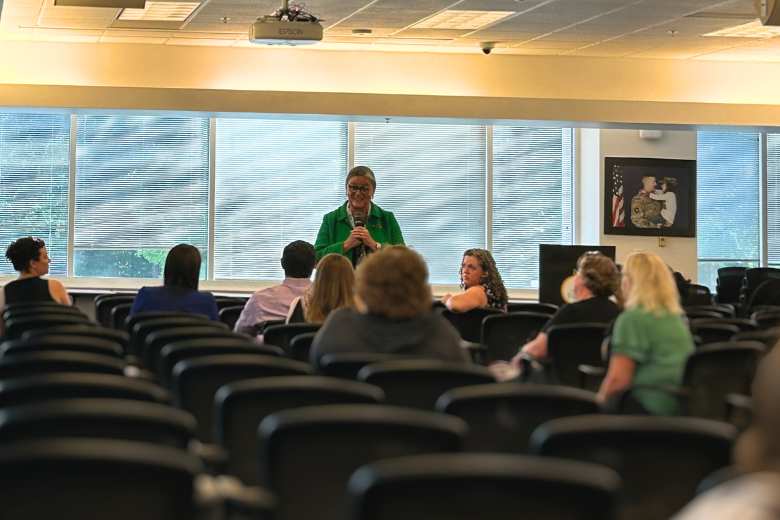
During a community meeting Tuesday, about a dozen Fairfax County parents and community members told the leader of Virginia’s largest school district that the decision to add extra elementary school early release days next year is disruptive and will impact their students’ learning.
The meeting, one of two Superintendent Michelle Reid is hosting this week, came less than two weeks after she announced plans to add seven early release days to the elementary school calendar, so teachers can finish state-mandated trainings.
With school board members and teachers in attendance, parents acknowledged teachers don’t have enough planning time, but expressed concerns about lost class time and changes to their students’ routines. Even with the half days, the county will meet state requirements for class time, Reid said.
To have the days “added to an already sparse calendar, with kids that are already behind because they didn’t go to school for two years, it’s very, very frustrating,” parent Michael Brown said after the meeting.
School districts across Virginia have been working on plans to give teachers enough time for the trainings. Northern Virginia superintendents have said the requirements tied to the Virginia Literacy Act, coupled with the rollout of new math and English language arts state standards, present a unique set of demands for educators.
Nearby Loudoun County Public Schools is closing schools to students for four days next year so teachers can finish the trainings, and Arlington Public Schools is considering adding two more professional development days next year.
The Virginia Literacy Act alone requires 27 hours of trainings for elementary teachers, Reid told parents Tuesday.
To give educators extra time, Fairfax County added seven elementary school early release days to the calendar. However, the district is providing programming and transportation for students whose families aren’t able to accommodate them leaving early.
During the meeting, Reid said licensed central office staff members will oversee the after-school options, which for some students could come in the form of high-impact tutoring. A committee, which Reid said will meet for the first time in July, will be tasked with overseeing the initiative. It’s expected to include parent groups and educators.
The school district’s plan, Reid said, was the most cost-effective option while considering the various needs of the county’s families. The plan “isn’t perfect,” she told parents, noting that elementary school planning time discussions with principals and teachers have been ongoing, but became “kind of critical with VDOE coming out with 27 hours of trainings.”
Middle and high school teachers in the district get more planning time than elementary school educators, Reid said.
But parents in attendance said they’re worried that students with disabilities won’t receive their normal essential services and parents won’t send students to school on the early release days. Some said their kids may act out because of boredom on half days or changes to their routines.
“I support the teachers and I support that they need time to plan for their kids,” parent Elizabeth Young said. “I just have a hard time wrapping my head around the seven half days.”
A longtime elementary school teacher, who chose to speak with WTOP anonymously because she’s not authorized to speak publicly, said change is challenging, but “the common thread is we all want a quality education for our children.”
“This will be my 32nd year of teaching,” she said. “And I’m at school until at least 6 o’clock every night doing what my students need me to do. It’s not a job that fits between seven and a half hours a day to do well.”
Some community members questioned whether the added elementary early release days for the 2024-25 school year calendar would lead to them being included in future school years.
Reid told parents that it’s not her intention to continue offering early release Mondays beyond next year “unless there’s an impact that’s positive.”
“At the end of the year, we’re going to evaluate the effectiveness of that and the impact on our student achievement and then make a decision about what to do moving forward,” Reid told WTOP after the session. “And of course, we’re going to have ample community input and engagement.”
The longtime elementary teacher, meanwhile, said time for professional development is essential.
“It’s no longer, ‘Read the story, answer the questions,’” she said. “That’s not what quality teaching is nowadays.”
Get breaking news and daily headlines delivered to your email inbox by signing up here.
© 2024 WTOP. All Rights Reserved. This website is not intended for users located within the European Economic Area.









